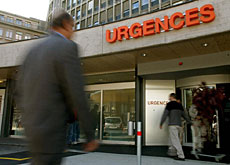
Illegal immigrants miss out on medical care

Illegal immigrants in Switzerland are not receiving basic medical care because of exorbitant costs and the fear of being reported to the authorities.
Those attending hospitals are often refused emergency treatment because they don’t have medical insurance.
This is despite a Swiss law that obliges hospitals to treat all emergency cases, regardless of whether or not the patient is covered.
According to the Contact Centre for Immigrants in Switzerland, hospital authorities sometimes report illegal immigrants, deterring others from seeking even emergency treatment.
Those illegal immigrants who do take a chance often use a false identity to avoid being found out. This can cause potentially fatal confusion over their medical history.
Beat Wagner, spokesman for the Swiss Red Cross, which provides health services for immigrants, says most illegal immigrants are unaware of what health care they are entitled to in Switzerland.
“They come from other cultural surroundings and are not familiar with a modern, western European healthcare system,” Wagner told swissinfo. “They do not know the language and they may have difficulties linked to their status in Switzerland.”
Right to insurance
Since 1996 it has been compulsory to have health cover in Switzerland. The law, reinforced last December in a directive by the Federal Office for Social Security, includes the right of illegal immigrants to medical insurance.
But most medical insurers continue to refuse their applications.
Mark Halldimann, a member of a support group for illegal immigrants in Bern, says he has repeatedly witnessed applicants without legal Swiss citizenship being systematically rejected by insurers.
“The Federal Office for Social Security has confirmed to us that it has received complaints about it,” he told swissinfo. “This proves that the directive is not being respected.”
Insurers reluctant
Nicole Bulliard, spokeswoman for santésuisse, which represents health insurers, says companies are often reluctant to arrange insurance for fear of attracting the attention of the immigration authorities.
Bulliard also claims it is difficult to set a premium when companies are unable to find out how long a person has been in the country.
But even if an illegal immigrant does succeed in being offered health insurance, the costs can be crippling.
On average they tend to earn between SFr1,000 ($760) and SFr1,500 per month. The monthly charge for basic health insurance is between SFr250 and SFr300.
But the alternative is either not receiving medical treatment or, in some cases, being charged large amounts by hospitals.
Crippling costs
The Information Centre for African, Asian and Latin American women cites one example of a female illegal immigrant who was told by the Triemli hospital in Zurich that she would have to pay SFr10,000 in order to get her broken arm treated.
For the hospitals, though, treating a non-insured person is not cheap. Delivering a baby can cost around SFr3,500, while a Caesarean section can set a hospital back SFr10,000.
Non-insured illegal immigrants can turn to private organisations offering healthcare at reduced or no cost.
However, according to a report by the humanitarian organisation Doctors Without Borders, these services vary dramatically between cantons.
The charity found that French-speaking cantons generally provided more assistance than the German-speaking ones.
swissinfo, Anne Rubin (translation: Joanne Shields)
Illegal immigrants are often afraid of seeking emergency medical treatment for fear of being reported to the Swiss authorities.
Those who do take a chance are often turned away because they don’t have health insurance or are charged exorbitant prices for treatment.
Under Swiss law, hospitals are obliged to treat emergency cases, even if patients don’t have insurance.
Illegal immigrants also have the right to health insurance, although they are often refused by insurers, or cannot afford it.

In compliance with the JTI standards
More: SWI swissinfo.ch certified by the Journalism Trust Initiative




























You can find an overview of ongoing debates with our journalists here . Please join us!
If you want to start a conversation about a topic raised in this article or want to report factual errors, email us at english@swissinfo.ch.